Warner Archive: The Amazing Captain Nemo
by Ben | April 27, 2010 5:19 pm
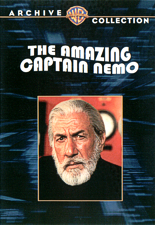 Warner Bros. (1978 / 2010), single disc, 102 mins plus supplement, 1.78:1, Dolby
Warner Bros. (1978 / 2010), single disc, 102 mins plus supplement, 1.78:1, Dolby
Mono, Not Rated, $19.95 (available online only from the Warner Archive Collection)
The Movie:
With the Warner Bros. Home Entertainment Archive Collection, the move to bring the Studio’s impressive library of titles has proven to be a big hit with collectors, with the Archive Collection allowing WB to put out rarities and some of the more obscure titles in their catalog; titles that may have their fans but otherwise not the kinds of numbers clambering to own them and make a mainstream DVD release even a moderate hit.
The basic scheme is simple: current video masters for many requested titles are dusted down and encoded, using a propriety process, to blank DVD discs, simultaneously providing fans with some of the hard to get titles they’ve been waiting patiently for and a way for the studio to get some of their more requested (but way down the restoration line) titles out on disc (and bring in a little revenue on masters that would otherwise stay lined up on shelves).
Sure, these discs may be priced a little over the odds, but for those that can appreciate they are made to order discs (and without any burnt in TCM-like corner logos) but they’re the only way to own good quality prints that, while may not have been restored to pristine condition, are still better than broadcast television. Such is the case with one of the latest titles in the line, The Amazing Captain Nemo, the amazingly kitsch television movie that saw a limited theatrical release when a proposed TV series was not picked up.
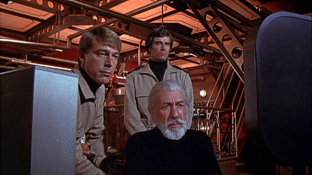 Produced by the legendary Master Of Disaster, Irwin Allen, Captain Nemo was an attempt to reclaim the fantasy television genre as his own, after great success on the small screen in the early 1960s and a latter string of flop cinema releases. Allen’s career had seen great highs and lows: in action films, from competing as a purveyor of documentary nature films (and winning an Oscar for The Sea Around Us in 1953), Allen produced or directed (or both!) a number of high-gloss productions that were very Disney-esque in their approach (Voyage To The Bottom Of The Sea, Five Weeks In A Balloon) and, of course, made as many waves as Uncle Walt in pioneering color TV shows, landing huge hits with Lost In Space, Land Of The Giants and The Time Tunnel.
Produced by the legendary Master Of Disaster, Irwin Allen, Captain Nemo was an attempt to reclaim the fantasy television genre as his own, after great success on the small screen in the early 1960s and a latter string of flop cinema releases. Allen’s career had seen great highs and lows: in action films, from competing as a purveyor of documentary nature films (and winning an Oscar for The Sea Around Us in 1953), Allen produced or directed (or both!) a number of high-gloss productions that were very Disney-esque in their approach (Voyage To The Bottom Of The Sea, Five Weeks In A Balloon) and, of course, made as many waves as Uncle Walt in pioneering color TV shows, landing huge hits with Lost In Space, Land Of The Giants and The Time Tunnel.
There was, if one was to draw further parallels to Disney, even an Allen theme park in the works at one point, echoing his reputation as a showman, and based on his catalog of disaster epics: The Poseidon Adventure had kick-started the genre in 1970, before such films were seen as follies, and even earned a Best Picture Oscar nomination, as did its follow up, the most expensive film of its day, the still immeasurably entertaining The Towering Inferno. Allen was keen to continually top himself, but found audiences were easier to please when laughing at his kinds of movies.
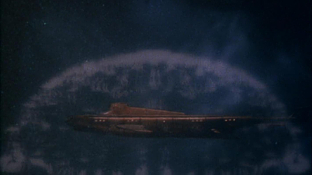 After Airplane! spoofed disaster films into oblivion, the likes of Fire!, When Time Ran Out, Flood! and the unintentionally hilarious The Swarm just couldn’t be taken seriously, the failed attempt to return to a previous triumph, Beyond The Poseidon Adventure, a waterlogged catalog of clichés that had Allen’s Master Of Disaster tag sticking for all the wrong reasons. A series of TV movies had led Allen back to the small screen, where he envisioned a new show that would mix elements of Jules Verne with one of his biggest successes, Voyage To The Bottom Of The Sea, which had been huge hit at the movies and a later TV adaptation.
After Airplane! spoofed disaster films into oblivion, the likes of Fire!, When Time Ran Out, Flood! and the unintentionally hilarious The Swarm just couldn’t be taken seriously, the failed attempt to return to a previous triumph, Beyond The Poseidon Adventure, a waterlogged catalog of clichés that had Allen’s Master Of Disaster tag sticking for all the wrong reasons. A series of TV movies had led Allen back to the small screen, where he envisioned a new show that would mix elements of Jules Verne with one of his biggest successes, Voyage To The Bottom Of The Sea, which had been huge hit at the movies and a later TV adaptation.
In 1954, Disney had started a genre of its own with his mega-budgeted version of 20,000 Leagues Under The Sea, heralding the movies’ fascination with the works of Verne and a whole series of adaptations and knock-offs. Although Nemo, of course, had gone down with his submarine, the Nautilus, in that film, as per Verne’s original novel, a 1970 big-screen return for Captain Nemo And The Underwater City was a fair enough continuation of the legend for its time, with spirited performances and terrific production value. But quite what kids in 1978 would have thought about The Amazing Captain Nemo, in the wake of such action filled adventures as Star Wars, can’t quite be determined.
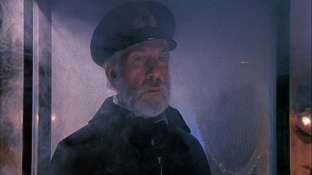 Only…it can: I saw The Amazing Captain Nemo on television in the early 1980s and was hooked. Indeed, I believe that this was my first exposure to the character, even if my young mind couldn’t differentiate between the quality (and, at the time, slow paced nature) of Disney’s big-budgets, and Allen’s throw everything in and see what sticks TV equivalent. Seeing it again after what must be 30 years, it really is quite silly stuff, and the TV origins are now painfully obvious. Originally intended as a series, only the pilot and the first couple of episodes were ever made, but instead of consigning the bonkers premise to the scrap heap, Warners sought to recoup a bit of money by way of an edited together movie, released theatrically but ultimately intended for television.
Only…it can: I saw The Amazing Captain Nemo on television in the early 1980s and was hooked. Indeed, I believe that this was my first exposure to the character, even if my young mind couldn’t differentiate between the quality (and, at the time, slow paced nature) of Disney’s big-budgets, and Allen’s throw everything in and see what sticks TV equivalent. Seeing it again after what must be 30 years, it really is quite silly stuff, and the TV origins are now painfully obvious. Originally intended as a series, only the pilot and the first couple of episodes were ever made, but instead of consigning the bonkers premise to the scrap heap, Warners sought to recoup a bit of money by way of an edited together movie, released theatrically but ultimately intended for television.
The set-up is a ludicrous as it is infectious: saving costs on period detail finds the amazing captain of the title cryogenically frozen aboard the Nautilus, which rests at the bottom of the sea. Coming across it, and releasing Nemo (Jose Ferrer, doing his best to stand motionless in his cryo-chamber) from his 100-year slumber, two modern-day marines suggest he redirect from his search for Atlantis to San Francisco for a refurbishment and supplies. This done, Nemo finds himself in dept to the US Navy, providing a nice “crisis of the week” for them to have him solve, usually involving none other than The Penguin – Burgess Meredith himself – as the captain’s arch nemesis.
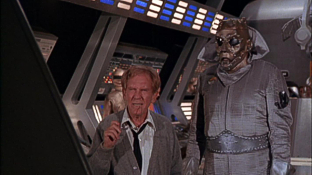 The whole thing is utterly bonkers: Meredith, years after Penguin, but during his Mickey phase in the Rocky movies, plays his world domination-planning professor as a combination of Balboa’s boxing coach and, often in the same scene, as someone who could be said to be slightly drunk.
The whole thing is utterly bonkers: Meredith, years after Penguin, but during his Mickey phase in the Rocky movies, plays his world domination-planning professor as a combination of Balboa’s boxing coach and, often in the same scene, as someone who could be said to be slightly drunk.
He has the funkier nuclear sub, a Battlestar Galactica styled disco room full of gadgets and humanoid robots (that are really, y’know, humans in robot costumes), including an obvious yet bizarre nod to Darth Vader (from the previous year’s Star Wars), a plodding clod of an alien whose mask I can’t make out: is it supposed to be a person under there wearing a mask, or is that supposed to be his actual face? The fact that, when he speaks, one can see his mouth moving behind the mouth-shaped hole doesn’t help confirm things!
There are other kitschy yet vastly enjoyable (if you’re in the right frame of mind) elements to amuse oneself too: when awoken from his sleepy state, no-one ever seems to wonder why Nemo, in his huge submarine, is the only one there, or how he can operate it by himself, or why the two marines quite willingly go along with him on their adventure without any questions.
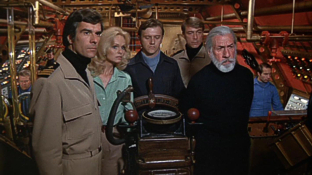 Even better are the streaming lines of cringe-worthy dialogue, guaranteed, when conveyed by the po-faced cast in the most sterling way possible, to raise a chuckle. “Sir, these clothes are absolutely terrific”, says one of the marines after donning the Nautilus uniform, the other adding, “I didn’t know they’d be so comfortable”! Other lines stand out, too: the sinister “No vessel can survive contact with a Delta Beam!”, “I believe a mine cable has become entangled in my fin”, or “I’ve lost control of my submarine”, are such chucklesome corkers.
Even better are the streaming lines of cringe-worthy dialogue, guaranteed, when conveyed by the po-faced cast in the most sterling way possible, to raise a chuckle. “Sir, these clothes are absolutely terrific”, says one of the marines after donning the Nautilus uniform, the other adding, “I didn’t know they’d be so comfortable”! Other lines stand out, too: the sinister “No vessel can survive contact with a Delta Beam!”, “I believe a mine cable has become entangled in my fin”, or “I’ve lost control of my submarine”, are such chucklesome corkers.
But, to be less flippant, there are moments that surprise: some of the miniature work is more than passable, especially for what was intended for television (resulting in a deserved Emmy nomination), and despite some tell-tale structural signs, the plot (combined between the scripts of no less than seven writers, including Psycho’s Robert Bloch, for some reason!), resolves itself over its three episodes to create good enough afternoon matinee fare. In the first act, Nemo is found in his cryogenic state (his real-life existence explained by Verne not only being a novelist but, as Nemo puts it, “a biographer as well”) and the Nautilus updated in San Francisco, before Nemo is asked to repay this debt by way of taking on the mad scientist Professor Cunningham, who has threatened Washington with his Doomsday Machine’s deadly Delta Beam!
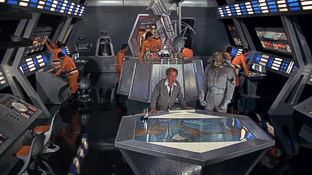 With Nemo victorious – just in time for a one hour show to end – the crew is joined by what would have amounted to regular cast members, including Linda Day George “as Kate”, the sub’s token female. But before Nemo can resume his search for Atlantis, Cunningham is back, stealing radioactive debris to power his nuclear sub (“Yes! Let’s go fishing! Let’s catch some radioactive fish that we can feed to my nuclear power plant!”), the Raven, in an attempt to destroy the captain.
With Nemo victorious – just in time for a one hour show to end – the crew is joined by what would have amounted to regular cast members, including Linda Day George “as Kate”, the sub’s token female. But before Nemo can resume his search for Atlantis, Cunningham is back, stealing radioactive debris to power his nuclear sub (“Yes! Let’s go fishing! Let’s catch some radioactive fish that we can feed to my nuclear power plant!”), the Raven, in an attempt to destroy the captain.
It’s this second episode that feels the most truncated, though this builds to a pretty tight mid-section before, in the third storyline, Nemo eventually, and rather abruptly, finds Atlantis. Here he finds the Atlantians (come on, you didn’t expect Atlantis to be devoid of life, did you?) antagonistic to the humans after Cunningham kidnaps the King’s brother. Naturally, Nemo wins them over, tracks the professor down, and saves the day again, after a surprisingly gripping adventure.
The mini-“episode of the week” storyline joins are a little obvious if you’re looking for them, but the aims of the show are pretty clear: Allen looks to be wanting to return to the ongoing series success of Voyage To The Bottom of the sea, while bringing a new angle to that venture by way of adding another long-favored Jules Verne (Allen had produced a previous Verne story too) element in Captain Nemo.
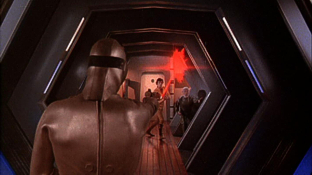 It would have been neat if the entire thing could have taken place back in the authentic Victorian age, but it looks like budgetary concerns, not to mention the Star Wars influence on anything that came out in the first couple of years after that film hit in 1977, won the day, bringing Nemo to our modern times to keep period detail at bay and a tone that would attempt to play to young 1970s audiences.
It would have been neat if the entire thing could have taken place back in the authentic Victorian age, but it looks like budgetary concerns, not to mention the Star Wars influence on anything that came out in the first couple of years after that film hit in 1977, won the day, bringing Nemo to our modern times to keep period detail at bay and a tone that would attempt to play to young 1970s audiences.
In the title role, Jose Ferrer is Nemo as a grandfather figure, with a crotchety twinkle in his eye, while the Nautilus sports a typically Victorian design (and a close approximation of Disney’s iconic shell) even when updated with “today’s communication devices” (including a Betamax video player!), and Meredith makes some just sometimes bizarre choices (including his wardrobe), while his professor’s grumbling alien henchman is just too bonkers for words. It’s a shame Allen’s name doesn’t actually appear in the credits: whether this is an intentional removal by him or other producers isn’t clear, but the end result certainly carries his fingerprints on the overall feel. Despite the fact that his career pretty much went into freefall after projects such as these failed to live up to the early success of his television series or mega-budget motion pictures, there’s an element of pure fun to be had with titles like The Amazing Captain Nemo.
The Disc:
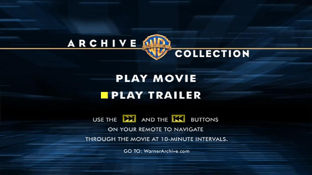 The very point of the Warner Archives is to bring material to disc in simple editions that are more focused on getting rarities out there rather than dressing them up with any special new bonuses that would only delay their release further. Each disc opens with a sixty second promo for the Archive Collection concept, highlighting among some of the films available in the ongoing series.
The very point of the Warner Archives is to bring material to disc in simple editions that are more focused on getting rarities out there rather than dressing them up with any special new bonuses that would only delay their release further. Each disc opens with a sixty second promo for the Archive Collection concept, highlighting among some of the films available in the ongoing series.
The discs are not chapter indexed but the films can be skipped through at ten minute intervals, so it’s easy enough to bookmark the nearest point to favorite scenes. Although the discs in the series are generally lacking subtitles and all use the same themed main menu, occasionally they surprise with an added trailer here and there.
Such is the case with The Amazing Captain Nemo, with the nice, non-advertised surprise of the film’s original theatrical trailer, shown in 4:3 format, and satisfactory in presentation; a very welcome inclusion. Pushing the special effects sequences, the influence of Star Wars and the producers’ attempts to update Captain Nemo’s adventures to cater to that crowd is abundantly clear, even down to the strains of the music score, which carries a dubious phrase or two that are remarkably close to John Williams’ fanfares.
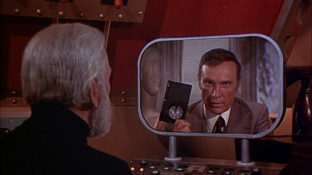 In terms of images, Warners has been very honest and very clear about the sources for these releases: no additional remastering or restoration is said to be carried out or claimed, but it’s obvious these are new transfers, since each film I’ve come across in the series are in much better condition than anything that I’ve seen play on television previously, and as usual, Warners present The Amazing Captain Nemo in its theatrical aspect ratio, anamorphically enhanced in 16:9. Here, I’m sure you’ll be impressed, for what amounts to a half-forgotten 1970s TV movie, to the largely stable and crisp image (forgiving the sometimes used stock footage); an image that shows the low-budget nature of the photography and lighting, but provides a solid picture that doesn’t give itself away too much in the effects shots.
In terms of images, Warners has been very honest and very clear about the sources for these releases: no additional remastering or restoration is said to be carried out or claimed, but it’s obvious these are new transfers, since each film I’ve come across in the series are in much better condition than anything that I’ve seen play on television previously, and as usual, Warners present The Amazing Captain Nemo in its theatrical aspect ratio, anamorphically enhanced in 16:9. Here, I’m sure you’ll be impressed, for what amounts to a half-forgotten 1970s TV movie, to the largely stable and crisp image (forgiving the sometimes used stock footage); an image that shows the low-budget nature of the photography and lighting, but provides a solid picture that doesn’t give itself away too much in the effects shots.
As with the image, Warners have been fortunate in sourcing very good audio for the audio mix, which comes through pounding and clear, again for a TV movie. No doubt the jump to theatrical level saw a bit more time and attention spent on the final result, and it’s a robust track. Without understandably going the whole 5.1 remix or restoration route, this Dolby 2.0 mono track is actually better than it needs to be, and along with a nice front speaker spread and some sometimes hefty bass, not one of the intermittently hilarious lines of dialogue will go missing.
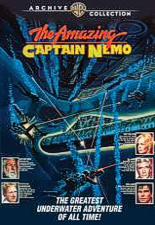 The Archive Collection’s one weak point, until a design change recently, has been in the packaging, though it may be pot-luck as to which cover you get for The Amazing Captain Nemo, which comes right in the middle of a switch to a newer approach to the collection’s sleeve art, which has reverted to a more commercial look, with original poster art used for the front of the sleeves, making nice use of those elements. Although the press releases show this new style [pictured right], the Captain Nemo DVD we actually received for review remained designed with the previous “uniform” approach, as seen at the top of this review.
The Archive Collection’s one weak point, until a design change recently, has been in the packaging, though it may be pot-luck as to which cover you get for The Amazing Captain Nemo, which comes right in the middle of a switch to a newer approach to the collection’s sleeve art, which has reverted to a more commercial look, with original poster art used for the front of the sleeves, making nice use of those elements. Although the press releases show this new style [pictured right], the Captain Nemo DVD we actually received for review remained designed with the previous “uniform” approach, as seen at the top of this review.
There’s nothing inherently “wrong” with this itself; it’s just a little “standard looking”, being a basic design template with each title retaining their original logos and poster or publicity images, while the synopses and info on the back are tailor made. In this case, the running time of 98 minutes on the sleeve seems to be a held-over typo from another title: the movie itself on the disc clocked in at over 102 minutes on my player.
A previous complaint was the lack of a pristine, shrink-wrapped product (older sleeves being inserted into what can feel like bulky low cost or second hand cases), which somewhat spoiled the excitement of owning a rare disc, but WB seems to have picked up on this now, and at least this copy of The Amazing Captain Nemo came shrink-wrapped like brand new, a basic requirement given the over the odds pricing that the line has come under some fire for. As with the other titles so far, Warners continues to use specific discs and software that make them more robust than home-made DVD-R creations), and the color surface label print is as good as any commercial release, adding to the authenticity of these basic but official releases.
Cinematic Classic or Faded Print?
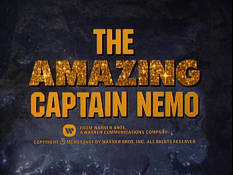 I’m still a big fan of the WB Archives and the many titles that have so far been brought to DVD that might otherwise be languishing in the back of a vault somewhere. The cost might well be seen to be over the odds ($20 for a pretty ropey television pilot-turned-movie matinee B-picture might be steep to all but the hard-core fans that desperately need every title in the Allen filmography), but this is the only way to pick up these titles without station idents or logos in the corner of the frame.
I’m still a big fan of the WB Archives and the many titles that have so far been brought to DVD that might otherwise be languishing in the back of a vault somewhere. The cost might well be seen to be over the odds ($20 for a pretty ropey television pilot-turned-movie matinee B-picture might be steep to all but the hard-core fans that desperately need every title in the Allen filmography), but this is the only way to pick up these titles without station idents or logos in the corner of the frame.
As such, The Amazing Captain Nemo is probably best saved for connoisseurs of so-bad-it’s-good or kitschy cinema, a sometimes abysmal, sometimes unintentionally hilarious, but always nostalgically entertaining splicing together of three television episodes that will have adults of a certain age remembering such delights from their childhood from behind cringe-induced hands!
many others directly from the online store at WB ARCHIVE COLLECTION[1]
- WB ARCHIVE COLLECTION: http://www.wbshop.com/Amazing-Captain-Nemo-The/1000150207,default,pd.html?cgid=&adid=ADSWACPR
Source URL: https://animatedviews.com/2010/warner-archive-the-amazing-captain-nemo/